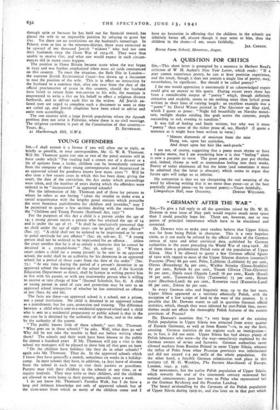A QUES TION FOR CRITICS
SIR,—This short letter is prompted by a sentence in Herbert Read's criticism of W H. Auden's New Year Letter, which reads: " If a poet cannot experience poetry, he can at least poeticise experience, and the result, though it does not contain a single line of poetry, may, nevertheless, be significant. But should it be called poetry? "
I for one would appreciate it enormously if an acknowledged expert could give an answer to this query. During recent years there has been a considerable output of " poetry " which, though definitely attractive and readable, seems to me nothing more than lyrical prose written in short lines of varying length: an excellent example was a " poem " by David Winser printed in The Spedtator on May 23rd, which I quote as prose: "Night fell beautifully on Navaho moun- tain, twilight shades striding like gods across the canyons, purple succeeding to red, evening to sunshine."
It was full of feeling and finely written, but why was it more " poetry " than some of the richer prose of, say, Hardy? (I quote a sentence as it might have been written in verse.) " Minute diamonds of moisture from the mist Hung, too, upon her eyelashes, And drops upon her hair like seed-pearls."
I am not, of course, suggesting that a poem must rhyme or have a regular metre, but I am wondering how it is that " feeling " alone is now a passport to verse. The great poets of the past put rhythm and, indeed, rhyme as well as tremendous feeling into their works. Poetry of today eliminates all but the latter (and sometimes it must be admitted that the latter is obscure), which seems to argue that future ages will judge us as inferior.
My contention is that we are cheapening the real meaning of the word by allowing writing that is no more than prose—or at the best poetically phrased prose—to be termed poetry.—Yours faithfully,
Llangedwyn Hall, near Oswestry. DORIAN WILLIAMS.


























 Previous page
Previous page